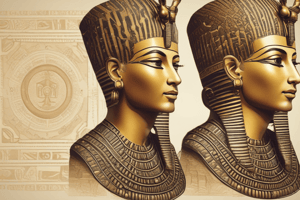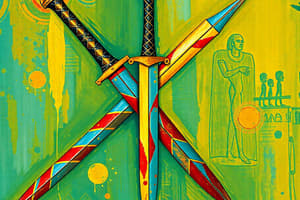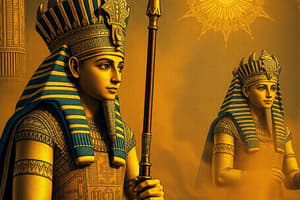Podcast
Questions and Answers
What are the reasons for the extinction of languages?
What are the reasons for the extinction of languages?
Various reasons such as cultural assimilation, globalization, lack of speakers, and political suppression contribute to the extinction of languages.
Do you think it is important to preserve languages?
Do you think it is important to preserve languages?
Yes, it is important to preserve languages for cultural diversity, historical understanding, and maintaining identity.
In what ways could we help prevent the extinction of languages and dialects?
In what ways could we help prevent the extinction of languages and dialects?
Promoting bilingual education, documenting endangered languages, and supporting language revitalization efforts are ways to prevent language extinction.
Why do you think the poet evoked the image of an engine in 'The Laburnum Top' poem?
Why do you think the poet evoked the image of an engine in 'The Laburnum Top' poem?
What does the phrase 'her barred face identity mask' mean in the poem 'The Laburnum Top'?
What does the phrase 'her barred face identity mask' mean in the poem 'The Laburnum Top'?
What technology was used to scan King Tut's body in 2005 for medical mysteries?
What technology was used to scan King Tut's body in 2005 for medical mysteries?
Why did Howard Carter have to chisel away the solidified resins to raise the king's remains?
Why did Howard Carter have to chisel away the solidified resins to raise the king's remains?
King Tut's body was buried with gilded treasures.
King Tut's body was buried with gilded treasures.
Match the following: List of deeds that led Ray Johnson to describe Akhenaten as 'wacky'.
Match the following: List of deeds that led Ray Johnson to describe Akhenaten as 'wacky'.
What revealing fact was discovered about King Tut's chest from an X-ray in 1968?
What revealing fact was discovered about King Tut's chest from an X-ray in 1968?
What was the result of the CT scan conducted on King Tut?
What was the result of the CT scan conducted on King Tut?
Flashcards are hidden until you start studying
Study Notes
Discovering Tut: The Saga Continues
- King Tutankhamun, the last heir of a powerful family that ruled Egypt and its empire for centuries, died in his late teens.
- He was laid to rest in a tomb filled with gold and funerary treasures, which were discovered in 1922 by British archaeologist Howard Carter.
- In 2005, King Tut's mummy was removed from his tomb for the first time in almost 80 years to undergo a CT scan, providing new clues about his life and death.
- The CT scan revealed new information about King Tut's body, including his head, neck vertebrae, hand, and rib cage.
Forensic Reconstruction
- Forensic reconstruction is a technique used to recreate the appearance of a person from their skeletal remains.
- In King Tut's case, the CT scan provided precise data for an accurate forensic reconstruction of the boyish pharaoh.
Howard Carter's Investigation
- Howard Carter discovered King Tut's tomb in 1922 and began investigating the mummy's three nested coffins.
- He found a shroud adorned with garlands of willow and olive leaves, wild celery, lotus petals, and cornflowers, indicating a burial in March or April.
- Carter encountered difficulties when he reached the mummy, as the ritual resins had hardened, cementing Tut to the bottom of his solid gold coffin.
- He used the sun to loosen the resins and eventually chiselled away the consolidated material to raise the king's remains.
Ancient Egyptian Funeral Practices
- The royals were fabulously wealthy and believed they could take their riches with them to the afterlife.
- King Tut was buried with glinting goods, including precious collars, inlaid necklaces and bracelets, rings, amulets, and a ceremonial apron.
- The Egyptians believed in the importance of preserving the body for the afterlife, and the mummy's body was treated with resin to prevent decay.
The Egyptian Mummy Project
- The project aims to record and scan all the mummies in Egypt, with almost 600 mummies recorded so far.
- The project uses a portable CT machine to scan the mummies, including King Tut, to reveal secrets about their lives and deaths.
The Curse of the Pharaoh
- The Egyptians believed in the concept of a curse that would befall anyone who disturbed the pharaoh's tomb.
- The story of the curse has been perpetuated through the years, with many believing that it is responsible for the misfortunes of those who have disturbed the tomb.
The Significance of the Discovery
- The discovery of King Tut's tomb and the subsequent scanning of his mummy have provided new insights into the life and death of the boyish pharaoh.
- The study of King Tut's mummy has also shed light on the practices and beliefs of the ancient Egyptians.
- The CT scan has revealed new information about King Tut's body, providing a more detailed understanding of his life and death.
Studying That Suits You
Use AI to generate personalized quizzes and flashcards to suit your learning preferences.





